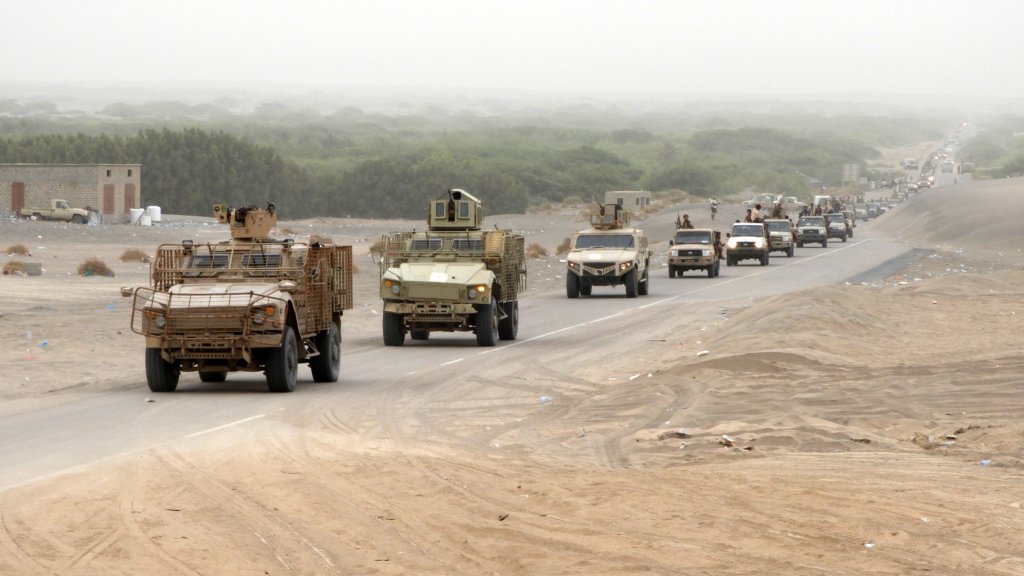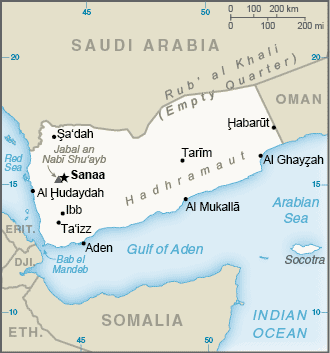Conflict and Crisis in Yemen
June 22, 2018 | Expert Insights

Conflict in Yemen has continued in the strategic port city of Hodeidah, with Saudi-led forces capturing the city’s airport. Iran-backed Houthi rebels still control the seaport and the capital city. The prolonged civil war has resulted in widespread civilian casualties. The United Nations has estimated that the fight could cost up to 250,000 lives.
Background
The Republic of Yemen is a relatively new state. Several dynasties ruled the region between the 9th and 16th centuries. The most powerful was the Rasulid dynasty. In early 20th century, the country was divided between the Ottoman and British empires. North Yemen gained independence from the Ottoman Empire in 1918, and the British withdrew from South Yemen in 1967. South Yemen became a communist country and North Yemen remained traditional to its roots.
In 1990, the two regions merged to form the modern Republic of Yemen. A short civil war broke out in 1994, in which the southern separatist movement was defeated. However, tensions re-emerged in 2009 with clashes between government troops and Houthi rebels. Yemen has been devastated by the war between forces loyal to the internationally recognized government of President Abdrabbuh Mansour Hadi and those allied to the Houthi rebel movement. The Yemen Civil war began in 2011 with the Arab Spring protests that led to the fall of the then President Ali Abdallah Saleh on charges of corruption and economic grievances. Hadi, his deputy minister at that time, took over the region. However, the increasing political instability in Yemen paved the way for the Houthi, representing the Shiite minority, to take over the territory.
A military intervention was launched by Saudi Arabia in 2015, to influence the Civil War in Yemen. A two-year Saudi-led campaign has damaged infrastructure and caused shortage of medicine in one of the poorest Arab countries. Reports have also emerged that there are players within Yemen who actively sponsor terrorism by funding activities conducted by ISIS. It is believed that Yemen is the base of militant groups including Al-Qaeda, adding tension to the region.
The Saudi-led coalition has retaken swaths of Southern Yemen. However, rebels still control the capital Sana'a, and most of the country’s populated regions. The conflict, widely seen as a proxy war between Saudi Arabia and Iran, has caused a humanitarian crisis, including a famine which threatened over 17 million people, and an outbreak of cholera which infected hundreds of thousands.

Analysis
The coalition of forces led by Saudi Arabia began an assault on Hodeidah (Al Hudaydah), Yemen’s main port city, on June 13th. Conflict has continued to grow, as the alliance captured the city’s airport on June 20th.
The battle is expected to spread to residential areas. Civilians have reported being stuck in their homes due to the fighting, and are running short on food and water supplies. Others are fleeing the city. Analysts believe that Houthi would have the upper hand in street-to-street combat, with snipers, landmines, and a strong foothold in the more populated parts of the city. Hodeidah has a population of approximately 600,000.
Saudi Arabia has accused the rebels of using the port to extort millions in bribes, and supply weapon imports from Iran. The coalition, which believes that the Houthi rebels are Iran proxies, has stated that it is working to end Iran’s expansion in the region. The Houthi rebels and Tehran have both denied claims. The Houthis claim to be working to end foreign meddling and corruption in the government.
The port city is critical as it acts as a supply link for the rebel-held capital Sana'a. If the coalition captures the port, it could cut off supplies to the rebel-held interiors. The Saudi coalition has already imposed partial blockades on other Houthi held ports, a move that humanitarian groups claim has exacerbated the crisis. UAE Minister of State for Foreign Affairs Anwar Gargash told Reuters after the airport capture that the coalition's plan was "to squeeze" the group.
The UN is currently making efforts to reach a political deal. UN food supplies (enough for 6 million people for one month) reached the city this week. However, damage to the port, which is approximately 20 kilometres way from the city, could worsen the humanitarian situation in the region. The ongoing battle has severely hit water supplies, leading to fears of another cholera outbreak. The UN has warned that a cholera outbreak could greatly increase the death toll. 22 million Yemenis are currently dependant on humanitarian aid. The WHO has estimated that 8.4 million are on the brink of starvation.
The coalition has told media that the port is currently “operating as normal”. “We have humanitarian and development plans for when we liberate the city,” spokesperson Colonel Turki al-Malki said.
On June 22nd, reports emerged that the Houthis could be willing to allow UN mediation. “Yemen’s Iran-aligned Houthis have indicated they would be willing to hand over management of Hodeidah port to the United Nations,” Reuters reported, citing sources. Houthi spokesperson Mohammed Abdelsalam reportedly noted the “positivity in dealing with the United Nations about the port’s revenues.”
Assessment
Our assessment is that Yemen is currently facing a humanitarian crisis, with shortages of food, water, and medicine. As stated previously, we believe that an attack on the critical Hodeidah port could push the Arab world’s poorest country into further chaos. We feel that UN intervention is necessary to ensure the provision of humanitarian aid to millions of Yemeni citizens. A political solution to the crisis would help save civilian lives. However, the proxy conflict between Saudi Arabia and Iran may be unlikely to reach a resolution in the near future.








Comments